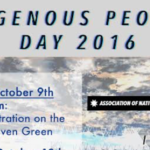by Haylee Kushi and Bobby Pourier
1. The term “Indigenous” encompasses a vast range of cultures, lands, languages, and peoples. Hence, Indigenous Peoples’ – emphasis on the apostrophe after the “s” – Day.
2. Even within the United States, American Indians hail from different tribal communities with distinct histories and cultures.
3. We celebrate Indigenous Peoples’ Day in the United States in place of Columbus Day, which commemorates a violent colonial history in the name of a tyrannical rapist who wasn’t even that good at sailing and navigating after all.
4. And even though we only celebrate IPD in the United States, “Indigenous” refers to Native peoples who experience settler colonialism all over the world – from Chamorros in Guam to the Eveny in Siberia to the Ainu in Japan.
5. Speaking of the Indigenous peoples of Siberia, the term “shaman” does NOT refer to any spiritual leader in any Indigenous community, but specifically to spiritual leaders of the Eveny. So your weird white neighbor who says he goes to a shaman every week is probably lying or getting scammed. Unless you live in Siberia.
6. Federally recognized tribes in the United States are separate political entities with their own governments. There are over 500 federally recognized tribes in the United States!
7. BUT because of the Supreme Court case Cherokee Nation v. Georgia (1831), tribes are considered “domestic dependent nations” of the United States, meaning that the US Federal courts (not tribal courts) get the final say for high stakes cases, and that the tribal government has limited sovereignty.
8. Some tribes are not recognized by the federal government but by the state government that absorbed their lands. There are other Native communities in the United States with no recognition at all, which means that they have no legal sovereignty.
9. And many Kānaka Maoli, the Indigenous people of the Hawaiian islands, are fighting not to be recognized as a tribe, because they maintain that the Hawaiian Kingdom was overthrown, and that they should hold full independence, and not “domestic dependent nation” status.
10. We celebrate Indigenous Peoples’ Day because despite a grueling history of settler colonialism and the continuation of Indigenous genocide today, Native people have survived and continue to grow their communities. Anishinaabe scholar Gerald Vizenor terms this “survivance’; “survivance is an active sense of presence, the continuance of native stories, not a mere reaction, or a survivable name. Native survivance stories are renunciations of dominance, tragedy, and victimry.”







